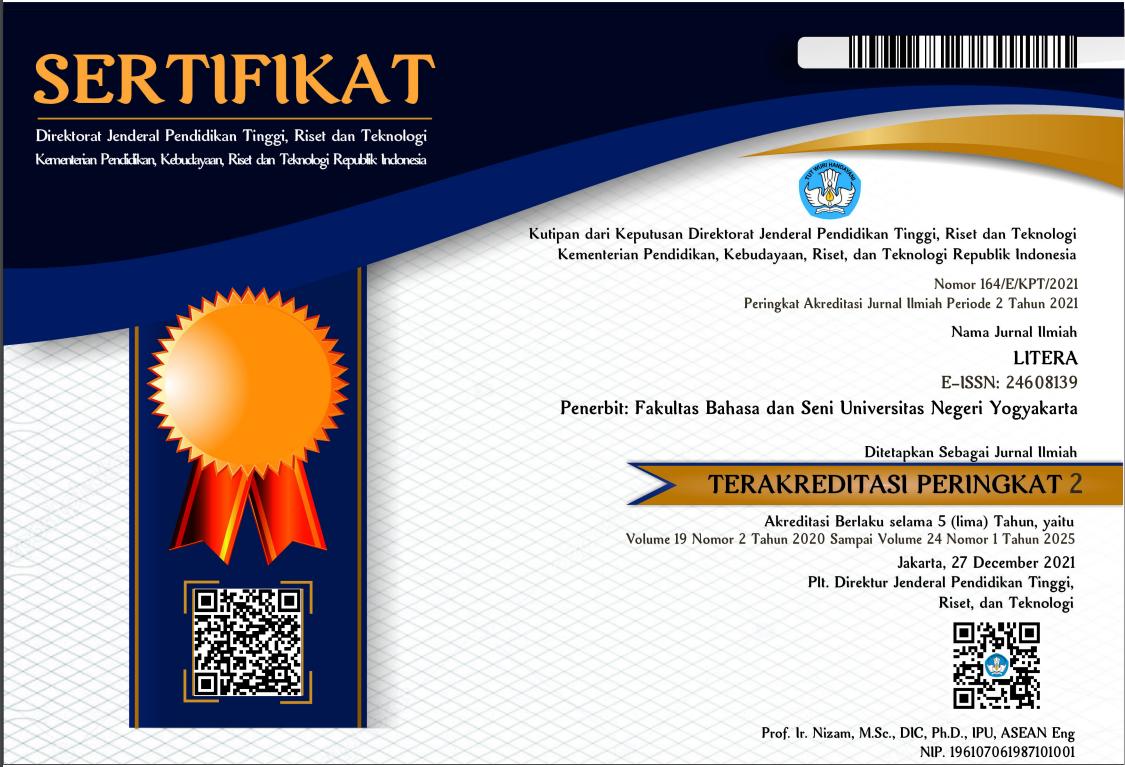ARTIKULASI KELAS BAWAH JAWA DALAM KUMPULAN PUISI PARA JENDERAL MARAH-MARAH KARYA WIJI THUKUL
Abstract
Penelitian ini bertujuan mendeskripsikan artikulasi kelas bawah Jawa dalam kumpulan puisi Para Jenderal Marah-Marah karya Wiji Thukul. Penelitian ini menggunakan pendekatan teori Cultural Studies yang sekaligus menerapkan metode kajiannya dalam tiga level yaitu: epistemologis, politis, dan strategis. Hasil penelitian sebagai berikut. Pertama, negosiasi perempuan kelas bawah Jawa dengan tujuan mengacaukan posisi kultural laki-laki yang mendekati absolutisme. Kedua, terungkapnya sisi kultural laki-laki dari sisi yang lain, yang menunjukkan nilai-nilai yang bertolak belakang dengan nilai-nilai adiluhung yang melekat padanya dengan tujuan menimbulkan chaos, melawan mitos, dan membangun mitos baru bahwa laki-laki tidaklah sepenuhnya adiluhung dan atau bahkan mendekati absolutisme. Ketiga, terungkapnya sistem yang secara struktural diatur sedemikian rupa oleh narasi besar atau negara yang belum berpihak kepada kepentingan rakyat kelas bawah.
Kata kunci: artikulasi, kelas bawah Jawa, Cultural Studies, Wiji Thukul
THE ARTICULATION OF THE LOWER CLASS JAVANESE PEOPLE
IN WIJI THUKUL’S POETRY COLLECTION PARA JENDERAL MARAH-MARAH
Abstract
This study aimed to describe the articulation of the lower class Javanese people in Wiji Thukul’s poetry collection Para Jenderal Marah-Marah. It used the Cultural Studies approach and simultaneously applied it in three levels, i.e. epistemological, political, and strategic levels. The results of the study are as follows. First, there are negotiations of the lower class Javanese women with the aim of disrupting men’ cultural position which nearly reaches absolutism. Second, there is a disclosure of the other side of men’s culture, which shows values contrary to the inherent noble values with the aim of causing chaos, confronting myths, and building new myths that men are not entirely noble and or even close to absolutism. Third, there is a disclosure of a system that is structurally organized in such a way by a great narrative or a state that has not been in favor of the lower class people’s interests.
Keywords: articulation, lower class Javanese people, Cultural Studies, Wiji Thukul
Keywords
Full Text:
PDFReferences
Ang, Ien. (2013). “Cultural studies matters (does it ?): engaging inter/discipli narity” in Inter-Asia Cultural Studies, Vol. 14, No. 3, page 433.
Belsey, Catherine. (2003). “From Cultural Studies to Cultural Criticism?” in Paul Bowman. Interogating Cultural Studies: Theory, Politics and Practice. London: Pluto Press.
Bennet, Tony. (2015). “Cultural Studies and The Culture Concept” in Cultural Studies, Vol. 29, No. 4, page 546.
Budiman, Manneke. (2014). “Stuart Hall: Gagasan dan Signifikansi” dalam makalah Seminar 100 Tahun Stuart Hall yang diselenggarakan oleh Kajian Budaya dan Media Sekolah Pasca sarjana UGM pada tanggal 28 Mei 2014.
Clarke, David. (2016). “Theorising the role of cultural products in cultural dip lomacy from a Cultural Studies pers pective” in International Journal of Cultural Policy, Vol. 22, No. 2, page 151.
Connell, Kieran & Hilton, Matthew. (2015). “The working practices of Birmingham’s Centre for Contemporary Cultural Studies” in Social History Vol. 40, No. 3, page 289.
Critchley, Simon. (2003). “Why I Love Cultural Studies” in Paul Bowman. Interogating Cultural Studies: Theory, Po litics and Practice. London: Pluto Press.
Davis, Helen. (2004). Understanding Stuart Hall. London: Sage.
Faruk. (2014). “Becek is Beautiful: Stuarhalling Pemilu Indonesia 2014” dalam makalah Seminar 100 Tahun Stuart Hall yang diselenggarakan oleh Kajian Budaya dan Media Sekolah Pascasarjana UGM pada tanggal 28 Mei 2014.
Grossberg, Lawrence. (2014). “Cultural Studies and Deleuze-Guattari: A pole mic on projects and possiblities” in Cultural Studies, Vol. 28, No. 1, page 18. Hall, Stuart. (2005). “Cultural Studies and
The Centre: Some Problematics and Problems” in Stuart Hall, et.als. (Eds.) Culture, Media, Language: New York: Routledge.
Harjito. (2014). “Kemandirian Perempuan Jawa dalam Cerita Tradisional”, Litera, Jurnal Penelitian Bahasa, Sastra, dan Pengajarannya, Volume 13, Nomor 2, Oktober 2014 hlm. 316-325.
Hebdige, Dick. (2015). “The Worldliness of Cultural Studies” in Cultural Studies, Vol. 29, No. 1, page 33.
Kendall, Gavin. (2001). Understanding Culture.London: Sage.
Milner, Andrew. (2002). Re-Imagining Cultural Studies: The Promises of Cultural Mate rialism. London: Sage.
McQuillan, Martin. (2003). “The Projection of Cultural Studies” in Paul Bowman. Interogating Cultural Studies: Theory, Politics and Practice. London: Pluto Press.
Morley, David. (2015). “Cultural Studies, Common Sense and Communications: The infra-ordinary, the interdisciplinary and the particular” in Cultural Studies, Vol. 29, No. 1, page 25.
Pickering, Michael. (2008). “Experience and the Social World” in Michael Pickering (Eds.). Research Methods for Cultural Studies. Great Britain: Edinburgh University Press.
Procter, James. (2004). Stuart Hall. New York: Routledge.
Regan, Tom O. (2013). “What matters for cultural studies?” in Inter-Asia Cultural Studies, Vol. 14, No. 3, page 459.
Ryan, Michael. (2010). Cultural Studies: A Practical Introduction. United Kingdom: Willey-Blackwell.
Slack, Jennifer Daryl. (2005). “The Theory and Method of Articulation in Cultural Studies” in David Morley & Kuan-Hsing Chen. Stuart Hall: Critical Dialogues in Cultural Studies. London and New York: Routledge.
Stacey, Jackie. (2015). “The Unfinished Conversations of Cultural Studies” in Cultural Studies, Vol. 29, No. 1, page 44.
Thukul, Wiji. (2013). Para Jenderal Marah-Marah. Jakarta: Tempo.
Turner, Graeme. (2014). “The Mark of Cultural Studies on Communication Research: A perspective from the audi ence” in Cultural Studies, Vol. 29, No. 1, page 52.
Vincent, Hudson. (2013). “Space for Cultural Studies: Conversations with the Centre” in Cultural Studies, Vol. 27, No. 5, page 673.
Wibawa, Sutrisna. (2013). “Nilai Filosofi Jawa dalam Serat Centhini”, Litera, Jurnal Penelitian Bahasa, Sastra, dan Pengajarannya, Volume 12, Nomor 2, Oktober 2013 hlm. 328-344.
DOI: https://doi.org/10.21831/ltr.v17i1.17059
Refbacks
- There are currently no refbacks.
______________________
__________________________________________________________________________________________________
The International Journal of Linguistic, Literature, and Its Teaching at http://http://journal.uny.ac.id/index.php/litera/ is licensed under a Creative Commons Attribution-ShareAlike 4.0 International License
__________________________________________________________________________________________________














